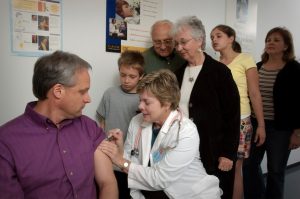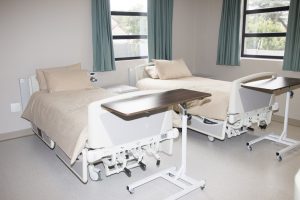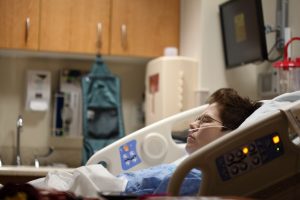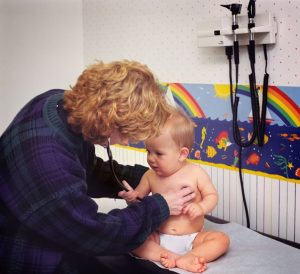What Do Public Health Nurses Do?
 According to the American Public Health Association, public health nursing is defined as “…the practice of promoting and protecting the health of populations using knowledge from nursing, social, and public health sciences.” Instead of being stationed in a hospital or clinic setting, public health nurses reach out to patients in the community. This allows them to assess their environment, available resources, and potential health care needs.
According to the American Public Health Association, public health nursing is defined as “…the practice of promoting and protecting the health of populations using knowledge from nursing, social, and public health sciences.” Instead of being stationed in a hospital or clinic setting, public health nurses reach out to patients in the community. This allows them to assess their environment, available resources, and potential health care needs.
Becoming a Public Health Nurse
Since specific patient populations are the focus of public health nursing, those interested in this specialty should be able to see the “big picture” in terms of community health needs. The assessment does not just focus on one patient—it involves the patient, the family, and the home and work environment—any factor that may affect the health of members of the community. Nurses must have exceptional assessment skills, be able to work independently, have a desire to lead and act as a role model, and have a lot of patience.
Additionally, many public health nurses work with underprivileged families, which can be emotionally draining. Public health nurses should be able to emotionally handle difficult cases and have a dedicated support system.
What Are the Education Requirements for a Public Health Nurse?
Those interested in the specialty of public health nursing should first pursue a nursing degree through a two or four-year university. Obtaining an Associate’s Degree in Nursing (ADN) or a Bachelor’s of Science in Nursing (BSN) is a requirement. However, BSN degrees are recommended for entry-level public health nursing.
Upon completion of an accredited nursing program, graduates must pass the NCLEX-RN in order to be eligible for licensure.
Master’s of Science in Nursing (MSN), Doctor of Nursing Practice (DNP), and Doctor of Philosophy (Ph.D.) nurses can advance their public health nursing practice to include leadership roles and research. For example, those involved in research can identify health and disease trends, patterns, and study outbreaks to find ways to improve the health of a community.
Are Any Certifications or Credentials Needed?
Certification in an area of public health nursing is sometimes required. Some BSN nursing programs incorporate public health nursing courses within the nursing program. Graduates can then apply for certification through the state nursing board. For nursing programs that do not have a public health focus, various educational institutions can fulfill the required curricula. Educational needs are dependent on the academic background of the applicant. The basic required coursework should include:
- Community health nursing
- Family-centered care
- Multicultural nursing care
- Nursing assessment
Nurses interested in public health certification should contact their state’s Board of Nursing to verify requirements.
The American Nurses Credentialing Center (ANCC) at one time offered an Advanced Public Health Nurse-Board Certified (APHN-BC) credential. However, this certification is now available for renewal only. The ANCC has begun offering a National Healthcare Disaster Certification (NHDP-BC) that may be of interest to public health nurses.
Read more for further clarity on public health nurse certifications.
Where Do Public Health Nurses Work?
Public health nurses provide many services and therefore can work in a variety of settings. Institutions may include:
- County health departments
- City health departments
- Federal health-related organizations
- Private public-health agencies
- Mobile units providing health care services
Public health nurses provide a wide variety of services depending on the place of employment. Specifically, public health nurses:
- Provide screening tests for specific populations
- Provide immunizations to adults and children
- Provide nutrition education for various programs, including the WIC (Women, Infants, and Children) program
- Collect data and look for trends/patterns in disease outbreaks
- Educate and treat infectious diseases, to include sexually transmitted diseases
- Educate high-risk populations (drug users, prostitutes, etc.) on healthy behavior and disease prevention
- Assist patients and families in psychosocial health to include effective communication, intimate partner violence, and abuse
- Respond and implement interventions in cases of natural disasters or community-wide emergencies
- Administer medications
What Are the Roles & Duties of a Public Health Nurse?
Public health nurses are a crucial part of the health care world. Many patients, especially those in underserved, rural, or underprivileged communities do not seek health care, or cannot afford to. Public health nurses reach out to educate and treat patients and families in need. Roles may include:
- Assessing psychosocial, mental health, physical and nutritional needs of a population
- Educating on the importance of preventive health, and preventive health screening
- Recognizing and intervening in cases of abuse or violence
- Motivating members of the community to adopt healthy behaviors and lifestyles
- Acting as a role model to the community
- Intervening and educating in cases of infectious disease outbreaks
- Utilizing and educating patients on available community resources
- Providing leadership within a community, especially in the cases of emergencies
Public Health Nurse Salary & Employment
While there is no official data on the outlook for public health nurses specifically, the Bureau of Labor Statistics reports that registered nursing, in general, is expected to grow 16% by 2024. Additionally, opportunities for health educators and community health workers, in general, is expected to grow 13% by 2024. This is promising to nurses interested in the field of public health nursing.
According to payscale.com, the average salary for a public health nurse is $56,111 annually. This figure can vary depending on degrees/certificates held, and city/state of employment.

 The psychiatric or behavioral health nurse specializes in caring for patients receiving treatment for a variety of mental illnesses, addiction, eating disorders or substance abuse. Patients with psychiatric disorders require a great deal of emotional support, education, and therapy from skilled mental health professionals. Working with patients and the interdisciplinary team, including case managers and social workers, to assess and provide a safe discharge environment is a large part of the day-to-day of a psychiatric nurse. This specialty is suited to the nurse who is patient and kind, but not afraid to lay down some boundaries when necessary.
The psychiatric or behavioral health nurse specializes in caring for patients receiving treatment for a variety of mental illnesses, addiction, eating disorders or substance abuse. Patients with psychiatric disorders require a great deal of emotional support, education, and therapy from skilled mental health professionals. Working with patients and the interdisciplinary team, including case managers and social workers, to assess and provide a safe discharge environment is a large part of the day-to-day of a psychiatric nurse. This specialty is suited to the nurse who is patient and kind, but not afraid to lay down some boundaries when necessary. The postpartum or mother-baby nurse is tasked with caring for both mother and newborn baby once a birth has taken place. This nurse utilizes a strong set of skills to recognize and act upon postpartum emergencies for both patients. The postpartum nurse appreciates a busy working environment and the challenge of quickly detecting complications from childbirth. A large part of this nurse’s job is teaching new mothers how to properly care for herself as well as her newborn after the delivery. Lactation nurses are often postpartum nurses who have become certified.
The postpartum or mother-baby nurse is tasked with caring for both mother and newborn baby once a birth has taken place. This nurse utilizes a strong set of skills to recognize and act upon postpartum emergencies for both patients. The postpartum nurse appreciates a busy working environment and the challenge of quickly detecting complications from childbirth. A large part of this nurse’s job is teaching new mothers how to properly care for herself as well as her newborn after the delivery. Lactation nurses are often postpartum nurses who have become certified. Plastic surgery nursing is a specialty that focuses on improving the appearance of a part of the body or face. This can be accomplished using invasive (i.e. surgery, lasers, injections) or non-invasive (chemical peel, microdermabrasion, medication) procedures. This role can be similar to an
Plastic surgery nursing is a specialty that focuses on improving the appearance of a part of the body or face. This can be accomplished using invasive (i.e. surgery, lasers, injections) or non-invasive (chemical peel, microdermabrasion, medication) procedures. This role can be similar to an  Perinatal nurses help care for women and babies throughout pregnancy, birth and postpartum, and usually up until the new baby is around a month old. Perinatal nurses educate their pregnant female patients about their unborn child. One of the largest roles of a perinatal nurse is to teach patients, spouses, and family members methods and techniques that can help ensure a healthy pregnancy. They educate patients on childbirth options, and how to bond with and care for the baby after it’s born.
Perinatal nurses help care for women and babies throughout pregnancy, birth and postpartum, and usually up until the new baby is around a month old. Perinatal nurses educate their pregnant female patients about their unborn child. One of the largest roles of a perinatal nurse is to teach patients, spouses, and family members methods and techniques that can help ensure a healthy pregnancy. They educate patients on childbirth options, and how to bond with and care for the baby after it’s born. A perianesthesia nurse works with patients that are undergoing or recovering from anesthesia or sedation. There are many levels of care that a perianesthesia nurse may work in or specialize in; these may include preparing patients for surgery or caring for patients that are waking up and recovering from anesthesia. A perianesthesia nurse may also be referred to as a recovery room or PACU nurse.
A perianesthesia nurse works with patients that are undergoing or recovering from anesthesia or sedation. There are many levels of care that a perianesthesia nurse may work in or specialize in; these may include preparing patients for surgery or caring for patients that are waking up and recovering from anesthesia. A perianesthesia nurse may also be referred to as a recovery room or PACU nurse. A pediatric endocrinology nurse works with children from birth to age eighteen, treating and managing endocrine disorders. The endocrine system produces hormones that help regulate processes that occur in the body such as breathing, growth, fluid balance, appetite, digestion, weight control and reproduction. The most common endocrine disorder a pediatric endocrinology nurse will treat is diabetes mellitus, as this condition is seen as young as infancy. Other
A pediatric endocrinology nurse works with children from birth to age eighteen, treating and managing endocrine disorders. The endocrine system produces hormones that help regulate processes that occur in the body such as breathing, growth, fluid balance, appetite, digestion, weight control and reproduction. The most common endocrine disorder a pediatric endocrinology nurse will treat is diabetes mellitus, as this condition is seen as young as infancy. Other  A parish nurse, also known as a faith community nurse, is a nurse who cares for members of a parish or faith community. They integrate faith and healing to promote wellness within the community they serve.
A parish nurse, also known as a faith community nurse, is a nurse who cares for members of a parish or faith community. They integrate faith and healing to promote wellness within the community they serve. The palliative care or hospice nurse provides compassionate care, typically for the terminally ill and those who have little hope of meaningful recovery. This type of nurse has a special interest in creating an environment of pain relief and comfort, and works to promote these aspects of care through the cooperation of friends and/or family. The goals of care in these situations then become relieving suffering through a thorough assessment of the needs of the patient and family on a psychosocial, physical, and spiritual level. This nurse coordinates with other providers to meet the needs of the family and patient. Once death has occurred, the palliative care nurse offers bereavement support and assists in helping the family make final decisions. They also work to prepare patients and families for a peaceful and comfortable end of life transition.
The palliative care or hospice nurse provides compassionate care, typically for the terminally ill and those who have little hope of meaningful recovery. This type of nurse has a special interest in creating an environment of pain relief and comfort, and works to promote these aspects of care through the cooperation of friends and/or family. The goals of care in these situations then become relieving suffering through a thorough assessment of the needs of the patient and family on a psychosocial, physical, and spiritual level. This nurse coordinates with other providers to meet the needs of the family and patient. Once death has occurred, the palliative care nurse offers bereavement support and assists in helping the family make final decisions. They also work to prepare patients and families for a peaceful and comfortable end of life transition. An otorhinolaryngology nurse – also known as an ear, nose and throat nurse – cares for patients with diseases or injuries of the ear, nose, throat, head or neck. Often referred to as ENT nurses, otorhinolaryngology nurses assist in the treatment of both acute and chronic conditions, including ear infections and allergies, laryngitis, sinusitis, tonsillitis, sleep apnea and injuries such as broken bones. ENT nurses treat all ages of patients, from infants to the elderly, with a sizable pediatric patient population.
An otorhinolaryngology nurse – also known as an ear, nose and throat nurse – cares for patients with diseases or injuries of the ear, nose, throat, head or neck. Often referred to as ENT nurses, otorhinolaryngology nurses assist in the treatment of both acute and chronic conditions, including ear infections and allergies, laryngitis, sinusitis, tonsillitis, sleep apnea and injuries such as broken bones. ENT nurses treat all ages of patients, from infants to the elderly, with a sizable pediatric patient population.